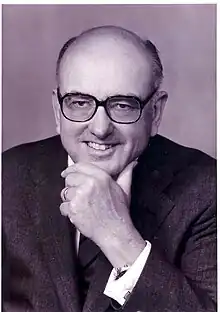Earl Flansburgh
Earl R. Flansburgh (April 28, 1931 – February 3, 2009) was a Modernist architect known for his extensive work in the Boston area.[2]
Earl R. Flansburgh | |
|---|---|
 | |
| Born | April 28, 1931 Ithaca, New York, U.S. |
| Died | February 3, 2009 (aged 77) Boston, Massachusetts, U.S. |
| Occupation | Architect |
| Spouse | Louise "Polly" Flansburgh[1] |
| Children | Paxus Calta John Flansburgh |
| Relatives | Ralph Hospital (father-in-law) |
Early life and education
Earl Robert Flansburgh grew up in Ithaca, New York.[3] His father, Earl Alvah Flansburgh, was a professor at Cornell University.[3]
Flansburgh graduated from the Cornell Architecture School in 1954,[3][1] where he was also a member of the Quill and Dagger society. While at Cornell, Flansburgh was manager of the freshmen's men orientation camp.[4] In 1957, Flansburgh received a master's degree from MIT, and taught in London as a Fulbright scholar.[5]
Ties to Cornell

Flansburgh and his wife Polly both had deep ties to Cornell University. Both their parents were professors there.[1] Polly's grandfather was a member of the school's first graduating class of 1869, which makes their son Earl Cornell's first-ever fifth-generation Cornellian.[1] From 1972 until 1987, he was a University trustee, serving as chairman of the Buildings and Properties Committee.[1] He designed the school's Campus Store and Builder's Wall; the store was honored with a citation by Progressive Architecture magazine in January 1969.[6][1]
In the 1980s, the Flansburgh-headed Buildings and Properties Committee approved the controversial decision to demolish Stone Hall, Roberts Hall, and East Roberts Hall, over the objections of the City of Ithaca and local preservationist groups.[7] [8] This trio constituted the original buildings of the New York State College of Agriculture at Cornell University, and listed on the National Register of Historic Places and as city historic landmarks.[8]
Career
In 1963, Flansburgh formed the architecture firm, Earl R. Flansburgh & Associates (ERF+A) in Cambridge, Massachusetts. In January 1969, "Progressive Architecture" selected Flansburgh's underground Cornell Campus Store for one of its sixteen Annual Design Awards.[9] Under his direction, the firm won over 80 regional and national design awards.[10]
Throughout his professional career Flansburgh also taught or lectured about architecture at institutions including Massachusetts Institute of Technology, Wellesley College, and the Architectural Association School of Architecture (London).
Flansburgh received the Award of Honor for Lifetime Achievement from the Boston Society of Architects in 1999.[3] His design of the Cornell University Campus Store was honored with a citation in Progressive Architecture Magazine in January 1969.[6]
Personal life
Flansburgh married Louise Hospital, the daughter of Ralph Hospital, in August 1955.[11][12] Louise went on to found Boston By Foot a not-for-profit group that gives walking tours of historic sites in Boston.
The couple had two sons, Earl Schuyler Flansburgh, born in 1957, now known as Paxus Calta, and John Flansburgh, born in 1960. Calta is an anti-nuclear activist; John is a member and co-founder of the musical group They Might Be Giants.
Earl Robert Flansburgh was buried by his family in February 2009 at Lincoln Cemetery in Middlesex County, Massachusetts.
References
- "Event Honors Two Dedicated Cornellians: Earl and Polly Flansburgh". AAP News (Fall 2008): 27. 15 September 2013. Retrieved 17 September 2019.
- Howard, Sebastian (March 12, 2009). "Earl R. Flansburgh, Prominent Boston Architect, Dies". Architectural Record. Retrieved 2014-02-09.
- Campbell, Robert (18 February 2009). "Earl Flansburgh; architect designed education facilities". The Boston Globe. Retrieved 26 August 2018.
- Flansburgh, Earl (November 4, 1953). "Flansburgh Argues that Co-education Would Hinder Discussion, Spirit". Cornell Daily Sun. Vol. 70, no. 33. p. 4. Retrieved 2014-04-01.
- "Earl R. Flansburgh Obituary (2009) Ithaca Journal". Legacy.com.
- "Citation: Campus Store is put underground to preserve trees and sloping contours of the site" (PDF). Progressive Architecture: 108–109. January 1969. Retrieved 17 September 2019.
- "Halls targeted for demolition". Ithaca, New York: The Ithaca Journal. 16 March 1990. p. 3. Retrieved 27 August 2023.
Members of the ... Board of Trustees adopted a resolution Thursday on the recommendation of the ... Building ad Properties Committee
- Journal Staff Reports (29 March 1985). "Trustee panel OKs Academic I changes on Ag Quad". The Providence Journal. Retrieved 27 August 2023.
- "About The Store". The Cornell Store. Archived from the original on 2006-02-23. Retrieved 2014-04-01.
- "About". Flansburgh Architects. Retrieved 2014-04-01.
- www.ancestry.com [https%3a%2f%2fsearch.ancestry.com%2fcgi-bin%2fsse.dll%3fdbid%3d61632%26h%3d2596963%26indiv%3dtry%26requr%3d2550866976735232%26ur%3d0&gsfn=&gsln=&h=2596963 https%3a%2f%2fsearch.ancestry.com%2fcgi-bin%2fsse.dll%3fdbid%3d61632%26h%3d2596963%26indiv%3dtry%26requr%3d2550866976735232%26ur%3d0&gsfn=&gsln=&h=2596963]. Retrieved 2022-09-17.
{{cite web}}: Check|url=value (help); Missing or empty|title=(help) - www.ancestry.com [https%3A%2F%2Fwww.ancestry.com%2Fdiscoveryui-content%2Fview%2F6437287%3A62116&gsfn=&gsln=&h=6437287 https%3A%2F%2Fwww.ancestry.com%2Fdiscoveryui-content%2Fview%2F6437287%3A62116&gsfn=&gsln=&h=6437287]. Retrieved 2022-09-17.
{{cite web}}: Check|url=value (help); Missing or empty|title=(help)